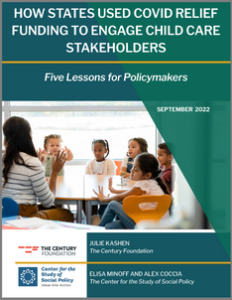Understanding the Experiences of Parenting Students and their Families
April 2023
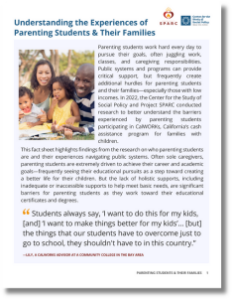
OR
OR

In 2022, the Center for the Study of Social Policy and Project SPARC conducted research to better understand the barriers experienced by parenting students participating in CalWORKs, California’s cash assistance program for families with children. This brief highlights findings from the research on parenting students’ experiences meeting their basic needs, including securing housing, child care, transportation, and taking care of their physical and mental health. The high costs of meeting basic needs and inadequate and inaccessible government assistance creates barriers for parenting students as they pursue their educational certificates and degrees.
(8 pp)
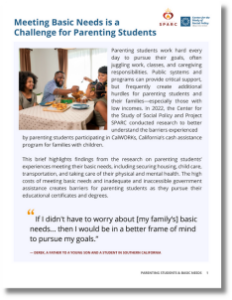
In 2022, the Center for the Study of Social Policy and Project SPARC conducted research to better understand the barriers experienced by parenting students participating in CalWORKs, California’s cash assistance program for families with children. This brief highlights findings from the research about parenting students' experiences navigating complicated program rules and requirements, including paperwork. This administrative burden creates significant hurdles for parents as they work toward their educational certificates and degrees.
(6 pp)
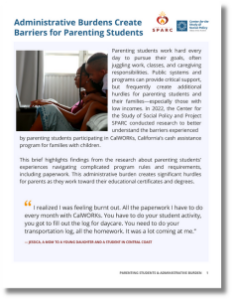
In 2022, CSSP partnered with the California Community Colleges CalWORKs Association’s Project SPARC (Student Parents Are Reimagining CalWORKs) to co-design research to better understand the barriers experienced by parenting students participating in CalWORKs, California’s cash assistance program for families with children. Together, SPARC leaders and CSSP conducted in-depth interviews with parenting students and community college campus CalWORKs staff, as well as surveyed over 600 parenting students. This video tells the story of how parenting students balance enormous responsibilities while navigating a range of public systems not designed for their families’ needs.

In its annual budget released in March 2023, the Biden administration once again proposed critical investments in families, including restoring the Child Tax Credit, establishing a national paid family and medical leave program, and expanding access to high quality child care and early education. This fact sheet shares how the Biden administration's proposals reflect what Black, Indigenous, and Latinx parents and caregivers have told us that they need.
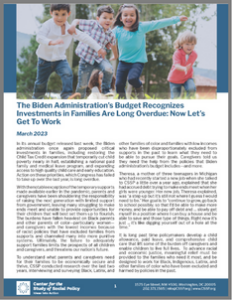
Young adults ages 18 to 25 are in a critical transition period as they set up their career paths, establish families of their own, and navigate newfound financial responsibilities. It is crucial to invest in this moment so that young people have what they need to thrive and to support their contributions to their families and communities. This two-pager offers top takeaways from Supporting Young Adults through a Guaranteed Income.
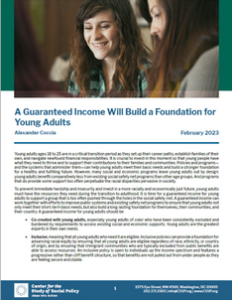
A prosperous society depends on ensuring that all young people can pursue their goals and thrive, and so it is crucial to invest in this moment both to make sure young people have what they need to thrive and to support their contributions to the lives of their families and communities. However, many young adults—whose earnings are typically low in this period—have trouble meeting basic needs and face systemic barriers and discrimination that exclude them from crucial resources and supports. This report presents the case for a guaranteed income to support young adults.
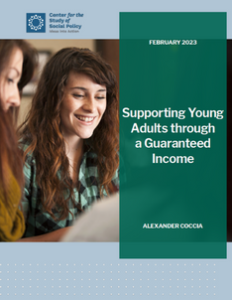
Watch the Center for the Study of Social Policy and a panel of parents and stakeholders discuss the impact of temporary investments made in families last year by the American Rescue Plan Act (ARPA) and to hear discussion around what’s needed now: permanent investments in families. The event will synthesized CSSP’s recent research with 45 Black and Latinx families in Michigan, Mississippi, and North Carolina on the impact of ARPA’s short-term investments in the Child Tax Credit (CTC) and child care.
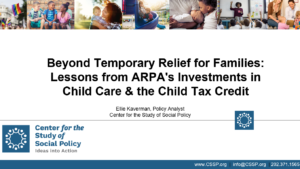
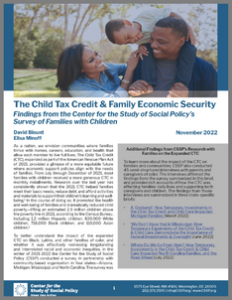
The COVID relief funding for child care provided an opportunity to observe how positive stakeholder engagement can lead to more equitable policy outcomes. The results of an in-depth look at the experiences in Michigan, North Carolina, and Mississippi demonstrate key lessons for effective stakeholder engagement.
Click here for a web version of this product (you will be redirected to the Century Foundation's website).
(15 pp)
